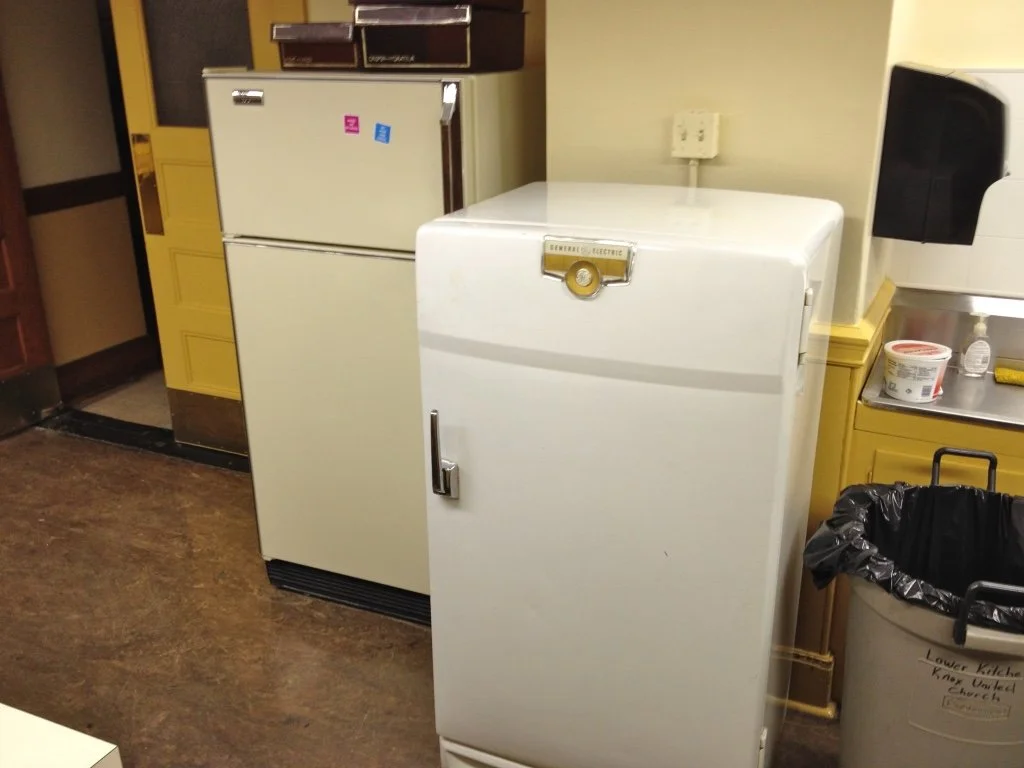Old fridges and freezers are energy guzzlers.
We all love to gather after worship and share food and drink together. It’s at these times that we grow as a community. For this reason alone, a major hub of activity in faith communities (post COVID) is the kitchen. So it is worth taking the time to look at the major energy consumers within this space in order to save some energy and money.
Fridges and freezers are present in every congregation’s kitchen. Typically, the efficiency of these kinds of appliances increases dramatically every few years with newer models. That means that the energy consumption of a new fridge compared to one made approximately five years ago can be half the energy! That’s a lot of energy savings to be had.
From coast to coast to coast, I have seen several examples where the freezers for fundraisers (those were great turkey pot pies), or food banks are so old that the cost to run these beasts is actually a liability for the fundraising or operation of the food bank.
Now, if your faith community, like many others, is rocking a donated Harvest Gold or Green Avocado fridge from the 1970s, it is absolutely impacting your bottom line, and the climate. A rule of thumb is if it has chrome on it, it’s really old! You can check the age of your fridge or freezer by looking for the manufacturer’s data plate. It should be right on it. If you don’t see the date, it will be baked into the serial number.
Older dishwashers also consume a great deal of energy. The newer commercial dishwashers work incredibly fast and are effective and fun to use; fun enough that some folks might get dragged into the kitchen “to help,” just so that they can play with these efficient washers.
For stoves, we really want to start moving away from gas stoves. Current research has shown that they have a massive impact on indoor air quality, and with continuously running pilot lights, burn fuel when not even in use (such as during the pandemic). Because of this, switching to electric stoves has become more common.
As with all appliances, when purchasing new, we want to purchase ENERGY STAR® rated ones, so we get the maximum value for our purchase. ENERGY STAR® rating means it is in the top 10% of efficiency for its category. So you get the best of the best.
To improve your building’s carbon footprint, you can also utilize our professional knowledge with virtual Green Audits that look at energy, air quality, food, water, waste, maintenance, rental agreements, heritage and much more.
The more you can learn about your building, the more you can save energy, minimize maintenance costs, and maximize the usage of your amazing faith community building.
Faithful Footprints Program
The United Church of Canada (UCC) Faithful Footprints program offers grants, tools and inspiration to help its congregations reduce their carbon footprint. With UCC’s commitment to reducing its greenhouse gases (GHG) emissions 80% by 2050, this one of a kind program offers up to $30,000 in grants towards energy conservation and renewable energy projects (conditions apply).
Faith & the Common Good is the delivery partner for UCCs Faithful Footprints program. To date, we have engaged over 200 UCC congregations, camps, and buildings across the country. Your participation in the program puts your faith into action and helps UCC reach its target.
Stephen Collette is the Building Manager for Faith & the Common Good and can be reached at 705-652-5159 EDT, scollette@faithcommongood.org



